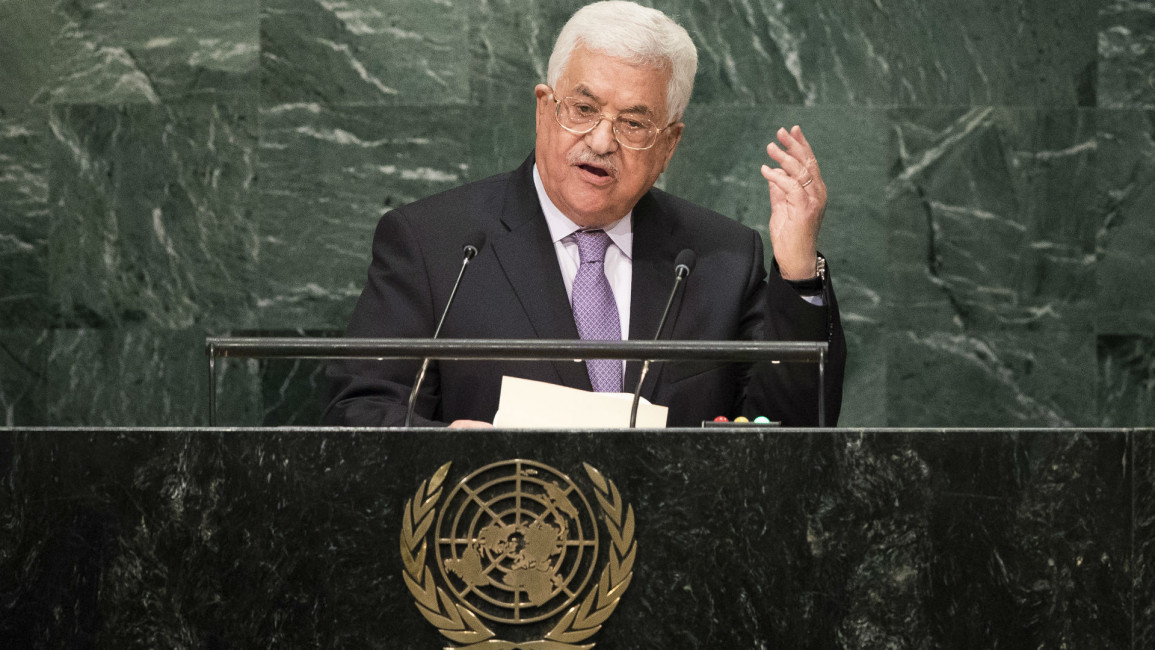
The Palestinian Authority's counter-productive pursuit of full UN membership
The recently convened informal UN Security Council meeting - a Palestinian Authority initiative supported by Angola, Venezuela, Egypt, Senegal and Malaysia with the aim of assessing Israeli settlement expansion - reached no outcome, other than that of reinforcing the predictability which surrounds this debate.
Israel's flaunting of its annoyance at scrutiny, coupled with its knowledge that the international community would not step outside the routine of meetings, should provide more than enough impetus for the PA to alter their course of feeble action. However, the PA remains committed to playing its role diligently, to the detriment of Palestine and Palestinians.
Israel's outrageous and unfounded claims of Palestinians advocating for ethnic cleansing have now become standard in official rhetoric. An unnamed Israeli official quoted in the Jerusalem Post stated, "No one, for instance, would even think about saying that a condition of peace would be that Israel be without Arabs."
Ostensibly, Israel has attempted to divert attention away from its own history of displacing, massacring and ethnic cleansing of Palestinians, which paved the way for significant areas of colonised Palestine to be entirely populated by settlers.
Closer to the truth - yet replete with inconsistency - was the executive director of B'Tselem, who declared: "You cannot occupy a people for 50 years and call yourself a democracy."
For the sake of clarity, it is important to insist upon the fact that occupation is a derivative of colonisation and territorial expansion. Limiting the excessive damage to Palestine by using misleading timeframe fails to challenge Israel's existence directly. In the absence of such distinction, any criticism levelled at Israel preserves colonial expansion - since there is no broad consensus about challenging colonialism and adhering to such a stipulation.
It is known that such convenience allows the PA to continue its duplicitous plans unhindered, while Israel moves with belligerence.
 |
What is left of Palestine is in disarray, lacking contiguity and, while not completely lost, is in danger of permanent annihilation |  |
Incurring loss
Prior to the UNSC session, Palestinian Ambassador to the UN Riyad Mansour also stated that the PA was seeking full UN membership for Palestine. According to the UN, membership "is open to all peace-loving states that accept the obligations contained in the United Nations Charter and, in the judgement of the Organisation, are able to carry out these obligations".
As usual, UN stipulations depart from generic premises without respect for the multitudes of realities, including those enforced upon populations by the UN and its member states. This observation should already constitute a major form of loss even from a general overview. When it comes to Palestine, the discrepancies are even more evident, given that the UN has allowed Israeli transgression through colonialism to ravage Palestine beyond even the definition of a state.
What is left of Palestine is in disarray, lacking contiguity and, while not completely lost, is in danger of permanent annihilation.
In pushing for full UN membership, the PA is continuing to provide evidence of its misplaced priorities. Just as most individuals and organisations campaigning for Palestine avoid explicit references to colonisation, the PA has no qualms about disregarding the struggles occurring within the territory in favour of ambiguous recognition without tangible benefits.
This means that the PA is disrupting a natural process - the struggle for liberation - in favour of gimmicks that will yield negative results, with the principal concerns remaining unaddressed.
Israel is doing its utmost to mangle Palestine beyond recognition, aided by the PA through security coordination and spurious diplomatic endeavours.
 |
The concept of a permanent population is undisputed, and it is Palestinian permanence that Israel has constantly sought to eliminate |  |
According to Article 1 of the Montevideo Convention on the Rights and Duties of States (1933), "the state as a person of international law should possess the following qualifications: a) a permanent population; b) a defined territory; c) government; and d) capacity to enter into relations with other states".
Article 3 of the same convention states that "the political existence of the state is independent of recognition by other states" and asserts that "even before recognition the state has the right to defend its integrity and independence".
If Article 1 is taken into consideration, Israel is endangering all four conditions. The concept of a permanent population is undisputed, and it is Palestinian permanence that Israel has constantly sought to eliminate. Israel has depleted Palestinian territory in violation of international law and in agreement with the UN which, despite its purported opposition to colonisation, has consistently refrained from addressing with Israel as the colonial power.
The internationally recognised Palestinian leadership is a mere extension of Israeli repression - and Palestine's capacity to enter into relations with other states, while not repressed, is certainly marked by its restrictions.
Article 3 is where the PA clearly prefers chaos over coordination. In recent years, much ado has been made about international recognition of a Palestinian state, while nothing on behalf of the PA signifies an attempt "to defend [Palestine's] integrity and independence". It is therefore, pertinent to question the purpose of pursuing full membership of the UN when the PA has failed to safeguard any Palestinian parameter.
Ramona Wadi is an independent researcher, freelance journalist, book reviewer and blogger specialising in the struggle for memory in Chile and Palestine, colonial violence and the manipulation of international law. Follow her on Twitter: @walzerscent
Opinions expressed in this article remain those of the author and do not necessarily represent those of The New Arab, its editorial board or staff.




